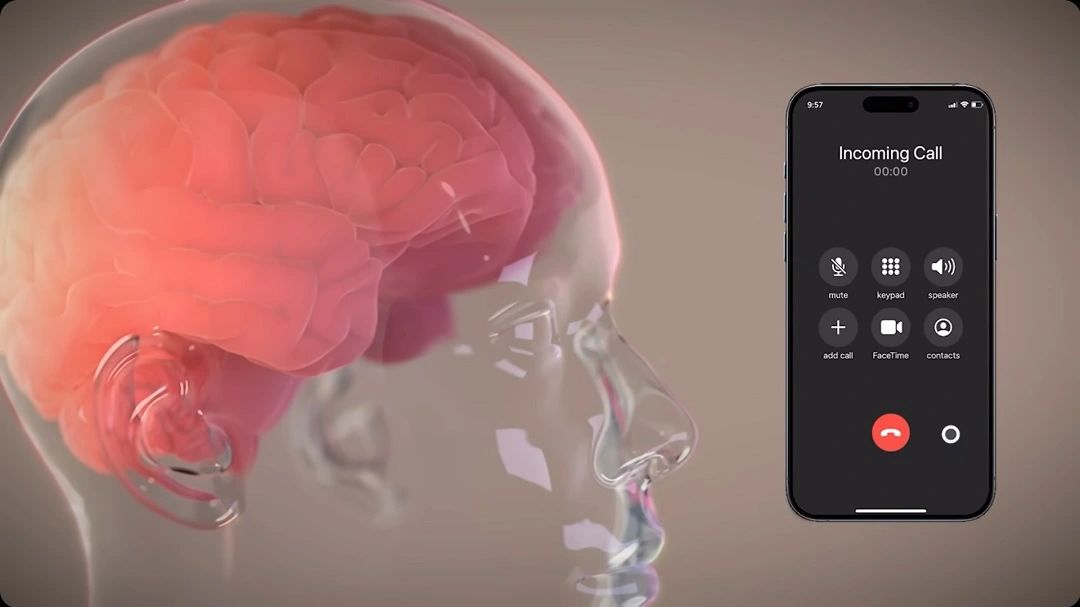Black Mirror, the sci-fi, near-future dystopian series that forces viewers around the world to ask tough questions about technology and where it is heading, is back with a new season. And the first episode, featuring brain-computer interfaces (BCIs), hits uncomfortably close to home.
Season 7 of Black Mirror opens up with the episode “Common People,” the tale of a woman who receives an expensive brain-chip interface implant to survive an aggressive brain tumor. The brain chip uploads part of her damaged brain to a cloud server to save her life. But the story soon takes a dark turn when the health tech provider increases monthly fees while significantly degrading the quality of their service.
It’s a classic Black Mirror twist — technology designed to help ends up being used to exploit. But beneath the fiction lies a more unsettling question: What if our minds could really be connected to the cloud? And if so, what’s to stop someone from breaking in?
We spoke to cybersecurity and privacy experts who watched the episode. They said that while the tech isn’t there yet, hacking someone’s brain isn’t such a wild idea.
Could someone hack your brain if you had a chip in your head?
Brain chip-cloud interfaces may sound like science fiction, but they are very real. Companies like Elon Musk’s Neuralink, to name just one of the many in this emerging industry, have already implanted chips in patients.
We asked Trevor Horwitz, CISO and Founder at TrustNet, if someone could hack a brain chip.
“If you’re syncing brain data to a server, you’re essentially moving someone’s thoughts or cognitive activity into a digital environment,” Horwitz said. “That creates an entirely new set of risks.”
From a cybersecurity standpoint — given that companies already struggle to secure basic data like passwords — neural data raises the stakes, Horwitz said.

“The biggest risk is that you implant a chip in your head, and then the company that makes the chip goes away,” Paul Bischoff, Consumer Privacy Advocate at Comparitech, added.
“You are then stuck with a chip in your head that has no future support, including security updates,” Bischoff said.
Other cybersecurity risks include the ability for third parties to steal and abuse your brain data.
From satirical dystopian criticism to real-world industry: Brain interfaces are already here
In the Black Mirror episode, the brain chip works just fine. The problem is the integrity and ethics of the company providing the service. The company uses the main character’s brain to process data from other patients, messes with the patient’s sleep time, and even takes over her body to run random personalized ads.
The episode is exactly the type of satirical scenario for which Black Mirror is known. However, the world of brain chip implants is very real.
On March 19, 2025, a report from The Insight Partners found that the brain implants market is projected to grow from $7.21 billion in 2022 to $17.65 billion by 2030, at a CAGR of 11.8%. The growth is driven by advances in neurotechnology and deep brain stimulation, as well as the rise in neurological diseases like Alzheimer’s and Parkinson’s as world populations age.
From North America to Asia, leading companies in this market include Medtronic, Boston Scientific, and Neuralink.

Medjacking, brain data, governments, courts, and insurance gaps
We spoke to Clyde Williamson, Senior Product Security Architect at Protegrity, who said that medical devices in the real world have serious privacy and security implications.
“Medjacking is a serious concern, and some medical devices have been recalled because they could have been hacked,” Williamson explained.
“Imagine what kind of metadata they will be storing in your hardware,” Williamson said. Timestamped geolocation data? Cross-correlated with your memory metadata, maybe?”
While governments have taken some action to build security and privacy into the healthcare industry as it embraces technology, with laws in Europe like the GDPR, HIPAA in the US, and others, gray areas still exist.
Williamson said that if brain implant interfaces go mainstream, lawsuits of the “brain-hacked” victims would roll through the courts, setting precedents and shaping the regulation landscape.
These court cases would answer whether technology manufacturers, surgeons, or others are responsible for an incident. Incidents in which brain implants cause damage to patients would be new territory for insurance companies, with some patients likely paying for premiums while others may not be able to afford hefty insurance price tags, Williamson said.
How serious can brain-hacking be?
How serious could cyberattacks targeting brain chips or their cloud services be? According to Williamson from Protegrity, we will not truly know until the first “brain-hack” happens. However, speculating on the most likely scenarios with brain-chip interface cybersecurity threats is frightening.
For example, an attacker could inject false readings into an automated medication system, leading to serious risks, said Williamson.

In contrast, Horwitz from TrustNet said that the data in these types of brain-chip interfaces is not just personal data. It could potentially include behavioral patterns, decision-making, or memory-related signals. These systems would be vulnerable not only to data theft and spyware but, more importantly, prone to manipulation.
Is the healthtech industry taking cybersecurity seriously?
In the Black Mirror episode, the fictitious BCIs are being designed to connect to the cloud for communication and data processing. In real life, this is exactly how BCIs work.
Horwitz said that any system that transmits or receives data is a potential target. The moment there’s wireless communication involved — Bluetooth, proprietary RF, or anything cloud-connected — the attack surface grows, Horwitz said.

While most BCIs are read-only today, it will become more than a privacy issue when the interfaces begin to send signals back into the brain.
“It’s a control issue,” Horwitz said. “If an attacker can inject data, they can influence perception or behavior. We’re not there yet, but that’s where it’s headed.”
“We’ve tested plenty of IoT devices and medical platforms with basic flaws. In most cases, security wasn’t part of the design process — it was added later, if at all,” Horwitz added, warning that that mindset must not carry over into neurotech.
We’ve tested plenty of IoT devices and medical platforms with basic flaws. In most cases, security wasn’t part of the design process — it was added later, if at all.
Trevor Horwitz, CISO and Founder at TrustNet
Today, brain chip impacts are used to restore functions for patients with paralysis or other conditions and to assist patients with communication.
“I’ve seen firsthand how often early-stage products in healthcare ignore security until there’s a problem,” Horwitz said, noting that there is a difference between a device that works well clinically but is still vulnerable due to unpatched firmware, weak authentication, or insecure APIs.
No one will control your mind — at least, not yet
We asked Bischoff from Comparitech if these types of brain systems can be hacked and how cloud vulnerabilities can be exploited.
“Someone could hack in and intercept the data that your brain is passing to the implant,” Bischoff said. “But the implants, as they exist now, are one-way. They read data from your brain but don’t input anything into your brain. No one is going to mind-control you through your Neuralink implant.”
Subscription-based brain-computer interfaces
Chris Hauk, Consumer Privacy Champion at Pixel Privacy, spoke about encryption and the risks of system interception and manipulation. But Hauk was also concerned about the business models and privacy impacts, issues that were featured prominently in the plot of the Black Mirror episode.
“As we’ve seen with streaming services (like Netflix), the initial subscriptions are cheap, with the service adding additional ‘premium’ tiers for an ever-increasing price unless you accept ads,” Hauk said.
“This leads to information about a subject’s daily life being used to target ads to those around her, much like target ads on the web today,” Hauk said. “Luckily, the technology isn’t quite there yet (as far as we know).”

Also, if a BCI company goes under (as startup tech firms often do), the patient could lose the benefits of the implant and be left with a useless hunk of silicon stuck in their head, with the data the device collected lost in an uncertain limbo, Hauk said.
Final thoughts
The Black Mirror episode “Common People” takes place in a not-so-distant future and is not based on current BCI technology. However, the similarities between the tech that exists today in our world and that which is presented in the series are significant.
The episode offers a valuable lesson for the healthcare tech industry on mistakes to avoid and how to keep the humanity of their patients in mind. The brain implant sector may be a for-profit business, but treating patients like customers carries too many risks.
While health tech continues to make quantum jumps by embracing technology, focusing on clinical success — as well as patient rights, privacy, and cybersecurity — is a must.
This is an independent publication, and it has not been authorized, sponsored, or otherwise approved by Neuralink Corp. Neuralink is a trademark of Neuralink Corp.






